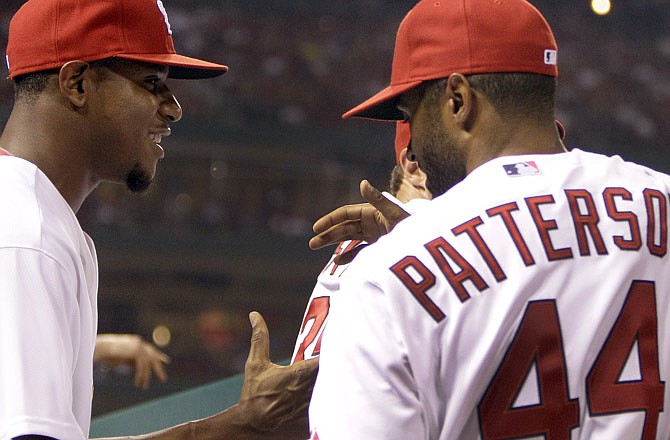ST. LOUIS (AP) - Edwin Jackson prefers to see the positive in being traded six times.
The right-hander was dealt twice Wednesday, going from the Chicago White Sox to the Toronto Blue Jays and then to the St. Louis Cardinals. He'll make his first start for St. Louis, his seventh major league stop, today.
"I guess I'm wanted. I'm definitely wanted," Jackson said. "A long as someone wants me, I'm happy. If someone doesn't want me, then it'll be a problem."
The trade also brought left-handed reliever Mark Rzepczynski and signaled the Cardinals' willingness to push for a postseason bid and worry about next year later. They gave up 24-year-old starting outfielder Colby Rasmus to the Blue Jays as part of the deal.
He heard rumors the last few days and joked "I feel like I was born on the move."
"It seems like with my name they don't end up being rumors, they always go through," Jackson added. "I had it in my head it might happen."
The 27-year-old Jackson was 7-7 with a 3.92 ERA for the White Sox and is a sub-.500 pitcher for his career at 55-58 with a 4.53 ERA, but throws in the mid- to upper 90s and the Cardinals believe he's capable of much better.
Jackson won 14 games for Tampa Bay in 2008 and 13 for Detroit in 2009, and threw a no-hitter for Arizona at Tampa Bay last year.
"Any guy who can go there and run the fastball 96 and 97 (mph) with a hard slider, I mean, that's just not average stuff," said Cardinals backup Gerald Laird, who faced Jackson in the American League. "When he's on and commanding all of his pitches, he's tough."
Jackson is set for free agency and could be a rental for a team that will have some big-dollar decisions in the offseason, starting with Albert Pujols. Still, general manager John Mozeliak would not say definitively that the Cardinals were done dealing.
"We'll turn the page and look at what's out there," Mozeliak said. "As far as handicapping what we'll do, I couldn't guess. We'll explore what's out there."
The move cost St. Louis a promising player in Rasmus. The Cardinals and Rasmus clashed over his decision to be coached by his father, Tony Rasmus, rather than work with hitting coaches Mark McGwire and Mike Aldrete. Much worse for the Cardinals, Tony Rasmus wasn't shy about touting himself.
"One thing I read that bothered me was that he said we changed Colby's game," manager Tony La Russa said. "I always wanted to call him and talk to him about it but I talked to Colby about it. I think he overplayed what was really going on and Colby was caught in the middle of it."
La Russa added there was always pressure to produce for Rasmus, a first-round pick of the Cardinals out of high school in 2005 who was the jewel of the farm system before arriving in the majors in 2009.
"Our fans expect him to be like Albert (Pujols), who had it all figured out right away," La Russa said. "That happens rarely. It upset our coaches and it upset me, accusations that we were down on him and had given up on him. That was so far from the truth that it was upsetting to us."
La Russa said the relationship got "shaky" at times after coaches would offer advice. La Russa wanted to send Rasmus to the minor leagues to iron out his hitting woes.
"Can he be a great player? Absolutely, if he learns and improves," La Russa said, though after the trade he referred to Rasmus as a "bench player."
Outfielder Lance Berkman said a perception La Russa greatly prefers working with veteran talent is a bit overblown.
"You know, by the time you get to this level it's not like getting coached up in Little League and fundamentals and things like that," Berkman said. "A lot of times, it just takes two or three years playing at major league level for a guy to internalize some of the things he's hearing from the coaching staff."

